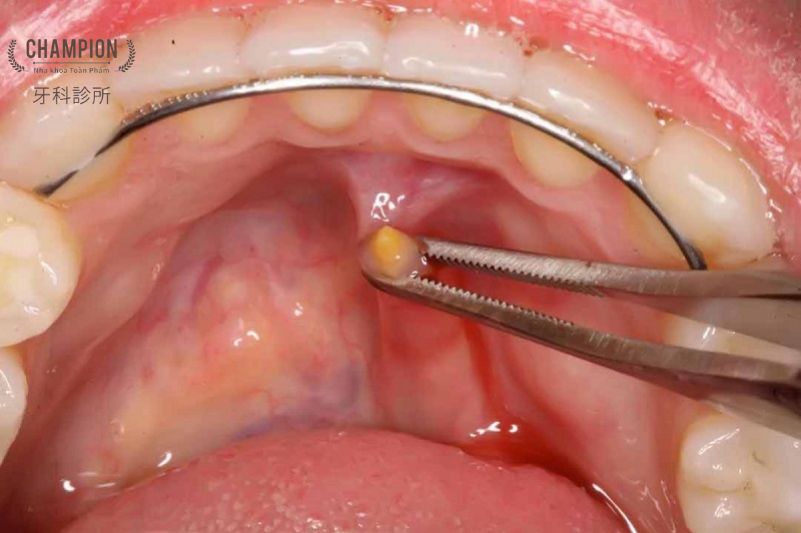Salivary glands are an essential part of our digestive system, playing a crucial role in the digestion of food and protecting our teeth from acid. However, when salivary glands undergo calcification, it can lead to various health issues and impact the quality of our daily lives.
Salivary Gland Calcification: What is it?
Perhaps few have heard of salivary gland calcification, commonly known as salivary gland stones. This is a health condition that is not frequently discussed but significantly impacts the quality of life for affected individuals.
Salivary gland calcification originates from the formation of stones in the salivary gland region. Typically, the accumulation of calcium in saliva is the primary cause leading to stone formation. Over time, this buildup can obstruct the ducts of the salivary glands, resulting in notable health issues.
Patients with salivary gland calcification often face difficulties while eating and experience discomfort. Symptoms include a sense of discomfort, pain, and potential difficulty swallowing. Overall health is also affected as patients struggle to enjoy food comfortably.

Detecting Salivary Gland Calcification
Salivary gland calcification, or salivary stones, can pose various health problems, especially when saliva flow is obstructed. Below are ways to identify symptoms and methods of diagnosing this condition:
- Patients may experience pain and pressure as if being squeezed in the salivary gland area, particularly during eating.
- The affected salivary gland area may become swollen and painful. Inflammation can cause swelling around the duct.
- Gentle massaging of the salivary gland often does not yield saliva flow, and sometimes stones can be felt inside.
- In cases of bacterial infection, patients may develop a fever, experience swelling at the jaw angle, and may exhibit pus.
- Inflammation can lead to the formation of an abscess, damaging nerves and causing facial paralysis.
Causes of Salivary Gland Calcification
Salivary gland stones have multiple origins, and understanding the causes helps in prevention and effective treatment. Here are some common reasons for salivary gland stones:
- Disordered metabolism of components in saliva, especially calcium, can be a primary cause. Increased viscosity of salivary fluid and crystallization of calcium in the ducts create conditions for stone formation.
- In some cases, stones may form in the salivary gland due to foreign objects or from an infected focus. These factors create conditions for undesired stone formation.
- Dehydration can increase the density of fluid within the glands, making it easier for calcium to accumulate as stones.
- Inadequate nutrient-rich meals are a factor that may elevate the risk of salivary gland calcification.
- Individuals with a history of gallbladder disease or salivary gland inflammation are more prone to developing stones. Certain long-term medications may also contribute to stone formation.
- Smoking, both actively and passively, is linked to an increased risk of various health issues, including salivary gland calcification.

Complications of Salivary Gland Calcification
Salivary gland calcification is often considered a mild issue, but if not treated correctly, it can lead to serious complications. Below are common complications that may arise when salivary gland calcification is overlooked.
Patients often face inflammation and increased swelling in the floor of the mouth or under the jaw. Persistent pain not only affects the ability to enjoy food but also impacts daily activities.
Persistent pain can become chronic, especially when occurring at night, leading to sleep disturbances, fatigue, and a general lack of vitality.
Neglecting or not focusing on treatment can lead to the disease progressing to a chronic stage, becoming prolonged. Treatment at this stage may require significant time and effort without guaranteeing an improvement in health.
Research indicates that if inflammation is not thoroughly treated, there is a risk of damaging the nerves surrounding the affected area. This can lead to facial paralysis and severe health deterioration.

>> See more: Yellow teeth caused by bad breath can teeth whitening help?
Effective Treatments for Salivary Gland Calcification
While salivary gland calcification may not be a major issue, it requires effective treatment to avoid complications and protect overall health. Here are some common treatment methods:
- Maintaining good oral hygiene is crucial to prevent the growth of bacteria and infections. Using antibiotics when signs of infection are present can help prevent spreading and reduce inflammation.
- For small stones, methods that stimulate saliva flow can be employed. Sucking on lemons or sour candies can help the stones pass through the salivary duct more easily.
- Physicians may perform massages or attempt to push smaller stones out of the salivary duct, particularly in cases of small stones.
- In the case of larger stones, stone removal may be done by making a small incision in the mouth to eliminate the stones.
- In complex cases of salivary gland stones, doctors often use endoscopy to observe and accurately remove the stones.
- For those experiencing recurrent stones or irreparable damage to salivary glands, surgical removal of the affected gland may be the last resort.
Conclusion
Maintaining the health of salivary glands is essential for ensuring proper digestion and protecting teeth from related issues. By adopting a healthy lifestyle and maintaining proper oral care practices, we can prevent salivary gland calcification and maintain overall health. If you are facing oral health issues, please contact Champion Dental Clinic for consultation and thorough examination.
Vietnamese & English: (028) 5411-2295
中文: (028) 5411-2297 172 Nguyen Luong Bang, Tan Phu Ward, District 7, Ho Chi Minh City.
Fanpage: Champion Dental Clinic 牙科診所
Zalo: Champion Dental Clinic
Youtube: Champion Dental Clinic 牙科診所
 Champion Dental Clinic
Champion Dental Clinic



